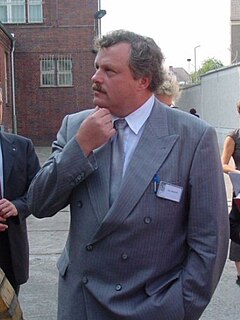
The Duden is a dictionary of the Standard High German language, first published by Konrad Duden in 1880, and later by Bibliographisches Institut GmbH. The Duden is updated regularly with new editions appearing every four or five years. As of December 2020, it is in its 28th edition. It is printed as twelve volumes, with each volume covering different aspects of the German language such as loanwords, etymology, pronunciation, synonyms, etc.

Berliner Fussball Club Dynamo e. V., commonly abbreviated to BFC Dynamo or BFC, alternatively sometimes called Dynamo Berlin, is a German football club based in the locality of Alt-Hohenschönhausen of the borough of Lichtenberg of Berlin. BFC Dynamo was founded in 1966 from the football department of SC Dynamo Berlin and became one of the most successful clubs in East German football. The club is the record champion of East Germany with ten consecutive league championships from 1979 through 1988. BFC Dynamo competes in the fourth tier Regionalliga Nordost. The club enjoys a cross-city rivalry with 1. FC Union Berlin and a historical rivalry with SG Dynamo Dresden. The rivalry with Union Berlin is part of the Berlin derby.

Football club (FC) was a designation for the elite football teams in the German Democratic Republic (GDR), commonly known as East Germany. They were formed in the mid-1960s as centers of high-level football.

Willy Riedel was a highly decorated Major in the Wehrmacht during World War II. He was also a recipient of the Knight's Cross of the Iron Cross with Oak Leaves. The Knight's Cross, and its variants were the highest awards in the military and paramilitary forces of Nazi Germany during World War II. He was severely wounded in early 1943 by a grenade splinter and taken prisoner of war by the Soviet Army. Following World War II, he served in the National People's Army of East Germany.

Siegfried Reiprich is a German human rights activist and author. He was involved in the resistance against the communist regime of the German Democratic Republic (GDR), which led to him being expelled from university and eventually banished from the GDR. In 2009, he was appointed by the Government of Saxony as the Director of the Stiftung Sächsische Gedenkstätten. In 2011, he was elected as a member of the Executive Board of the Platform of European Memory and Conscience.
Werner E. Ablaß is a German politician who was a Christian oppositionist in East Germany (GDR). Together with minister Rainer Eppelmann, Secretary of State in the Ministerium für Abrüstung und Verteidigung (MfAuV), Ablaß played a major role in the closure of the National People's Army (NVA) during the German reunification.

Aufbau-Verlag is a German publisher. It was founded in Berlin in 1945 and became the biggest publisher in the GDR. During that time it specialised in socialist and Russian literature.

The Nordfriedhof is a public cemetery run by the city of Leipzig, located at Berliner Straße 125–127 in the district of Eutritzsch between Hamburger Straße, Theresienstraße and Maximilianallee, directly adjoining the smaller Old Jewish Burial Ground.
Ilko-Sascha Kowalczuk is a German historian and author. His work is focused on the German Democratic Republic and its Ministry for State Security.

Bronshtein and Semendyayev is the informal name of a comprehensive handbook of fundamental working knowledge of mathematics and table of formulas originally compiled by the Russian mathematician Ilya Nikolaevich Bronshtein and engineer Konstantin Adolfovic Semendyayev.
The Verlag Harri Deutsch with headquarters in Frankfurt am Main, Germany, as well as in Zürich and Thun, Switzerland, was a German publishing house founded in 1961 and closed in 2013.

The Schwedt military prison was the only military prison in the German Democratic Republic which was opened in 1968 and was located in the northeastern city of Schwedt. It was used for the imprisonment of members of the National People's Army and the Volkspolizei-Bereitschaft of Ministerium des Innern (DDR). Around half of those detained were for crimes such as assault, theft, but also "anti-state agitation" or defamation of the state, and military crimes such as refusal to obey orders, desertion, or consuming alcohol on duty. Smaller offenses were often used as an excuse to suppress political dissent, the expression of individuality and different thinking and to punish them under the pretext of the rule of law of the GDR.

Peter Heinz Feist was a German art historian.
The Wochenpost was an East German weekly. It was founded in 1953, and circulation peaked at over one million copies per issue from 1971 to the German reunification. The academic Deirdre Byrnes writes that the paper was "one of the most influential" in East Germany. Its highest circulation was around 1.2 million copies, making the paper the most popular weekly in East Germany. It was considered a paper for intellectuals.
Kurt Johnen was a German pianist, music educator and musicologist.

Eberhard Rebling was a German pianist, musicologist and dance scholar as well as an anti fascist.
Werner Felix was a German music historian and Bach scholar. He was rector of the Hochschule für Musik Franz Liszt, Weimar and the University of Music and Theatre Leipzig as well as president of the Chopin-Gesellschaft of the DDR.

Werner Heiduczek was a German writer. His works have been translated into more than 20 languages and name as author – depending on the language region – Verner Gajduček, Verners Heidučeks or Verneris Heidućekas.

Michael Tschesno-Hell was a screenwriter and cultural official of the Deutsche Demokratische Republik.
Verlag Enzyklopädie was an East-German publishing house located in Leipzig. It was founded on 1 November 1956 by the German Democratic Republic (GDR) as a VEB. In 1964, the publishing house was merged with the larger VEB Bibliographisches Institut (BI), with which it had previously cooperated already, but it retained its legal independence.
![Berlin-Mitte, Taubenstrasse 10
, former Patzenhofer Brauerei [de] Berlin, Mitte, Taubenstrasse 10, Patzenhofer-Brauerei.jpg](http://upload.wikimedia.org/wikipedia/commons/thumb/1/17/Berlin%2C_Mitte%2C_Taubenstrasse_10%2C_Patzenhofer-Brauerei.jpg/330px-Berlin%2C_Mitte%2C_Taubenstrasse_10%2C_Patzenhofer-Brauerei.jpg)












